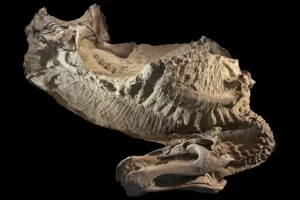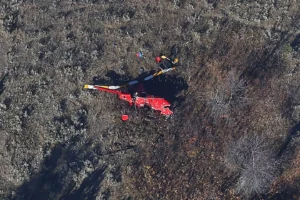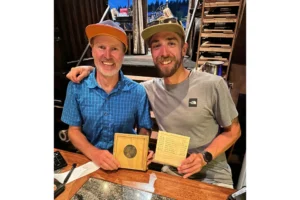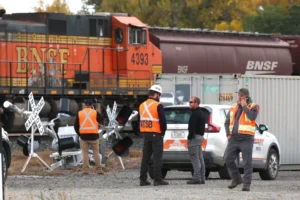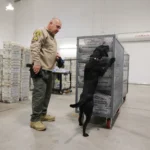THE SEARCH FOR IRENE: Cadaver Dog Team Joins Search for Missing Kenyan
Goshen County search and rescue team follow up on tip
- Published In: Other News & Features
- Last Updated: Aug 29, 2022
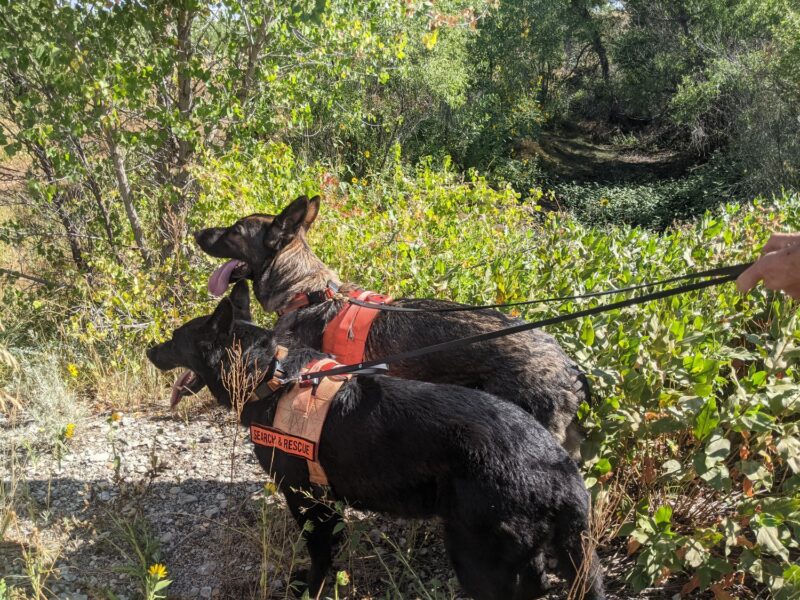
Working cadaver dogs Pax and Scout wait patiently for Jerry Numon, their K9 handler, to release them in the woods in Gillette's McManamen Park to search for the missing Irene Gakwa. (Wyoming Truth photo by Jennifer Kocher)
By Jennifer Kocher
Special to the Wyoming Truth
GILLETTE, Wyo.—Jerry Numon trudged through the knee-high reeds along Burlington Lake with his eyes trained on his cadaver dog Pax. Numon was looking for slight head tips, changes in breathing, a drop of the head or tail and a dozen other indicators that the 6-year-old Czech German Shepherd had detected human remains.
Numon was called in by the Gillette Police Department on Aug. 26 to search the roughly 1.5 miles around the lake in McManamen Park for Irene Gakwa, 33, who disappeared from Gillette in late February. The Kenyan nursing student moved to Wyoming from Idaho last year with her 38-year-old fiancé, Nathan Hightman, who is considered a “person of interest” in her case, according to police. Hightman has since been charged with five felonies related to financial and intellectual property crimes following her disappearance.

The police brought in Numon and his Eastern Wyoming Search and Rescue K9 Mounted Team to follow up on a tip, said Lt. Brent Wasson; he declined to provide additional information about the search or the ongoing investigation.
Along with his two cadaver dogs Pax and Scout, Numon also brought another cadaver dog handler, as well as Tony Goulart, a 45-year-old Lingle resident, and his horse, Sara. The 12-year-old mustang can detect human decomposition: she helped find a body found in a river during a search and rescue in Nebraska.
Acquired taste
Numon begins a lot of his sentences with “that time we were called to a possible burial ground of a serial killer” or “when we found that dead body in the mountains.” As if that doesn’t make him weird enough, Numon joked, he also loves the sound of a barking dog because it shows its enthusiasm.
“This is why I’ve been single for the past 25 years,” he said, laughing. “Nobody wants to hang around me.”
At 75, Numon is more agile than many men half his age. He has worked with cadaver dogs and search and rescue since 2004. Numon is technically retired, and before he became a K-9 trainer and search and rescue leader, he was a gym teacher, coach and high school principal in Colorado and Wyoming. He also taught high school equivalency courses for the Wyoming Department of Corrections.
Per the rules of his licensing, Numon must be invited by law enforcement to conduct a search. He and his team work mainly in Nebraska, Wyoming and the Mountain West region.
Most of the time, they work for free if a law enforcement agency lacks the budget to pay for their services. This trip is on him, Numon said, and so far, he’s out $600—the cost of meals and hotel rooms for the group.

A couple hits
The team began their search at 7 a.m. with a half dozen Gillette police officers in tow. Numon likes to get an early start, because smells tend to dissipate as the temperatures rise later in the day.
He trailed behind Pax in his bright orange vest, calling out commands in German. Dog handlers use a variety of languages when working with K9s, but Numon prefers German because the harsh consonants and guttural stops make a distinct impression on the animals.
“There’s no ambiguity about what I’m asking them to do,” he said.
Numon stopped when Pax darted into a thicket at the base of a tree. The canine sniffed the bushes before jumping up and placing both front paws on the trunk. Numon craned his neck to see what had captured Pax’s interested, but was stumped.
“He smells something,” Numon said. “I just can’t see what it is.”
Cadaver dogs can detect over 550 smells from decomposing human bodies, including blood, bones, tissue and plasma. The odors can be in the water, air or buried underground. In fact, to become a nationally certified cadaver dog like Pax and Scout, canines must find bone fragments buried, elevated or on the ground across three 80-acre fields.
Human decomposition can stick around for decades, Numon said. But to these dogs, it’s just like death happened yesterday. On seven homicide investigations, Pax has found several cadavers and other evidence that helped police solve cases. So when he indicates, Numon takes it seriously.
As he always does, Numon brought Scout to check on Pax’s work. Scout, also a Czech German Shepard, is three years younger than Pax and has boundless energy. Because Pax suffered a back injury that cost Numon $13,000 in medical expenses, Scout does most of the mountaineering work.
Both dogs have their own style of indicating human remains. Pax will lay down and bark, while Scout just lays down silently. Both will stay put if Numon tries to walk away without seeing what they do.
Numon has learned to identify all their little quirks. Some handlers like to run two dogs at once, but he doesn’t. If human remains are found, both would try to claim it.
“That would be one hell of a dog fight,” he said.
In this case, Scout also showed a prolonged interest in the tree and looked up, indicating that he’d found something. Numon checked again and still saw nothing. Still, he trusts his dogs’ instincts. It could be blood from an old cut or body oils that seeped into the ground and are now being released through the leaves.
He’s not sure, so the police mark the tree’s GPS coordinates and promise to look into it.

Two hours later, the dogs continued to take turns searching different areas around the lake. Both bit at the water to taste it, though neither indicated enough to convince Numon that it was worth taking out the boat for a sonar search.
Meanwhile, Pax headed into another thicket of weeds, accidentally flushing out an unsuspecting duck without even flinching. Had he followed his instincts and chased it, he wouldn’t be a cadaver dog, Numon explained. Part of their training is to tamp down their natural inclinations and focus solely on detecting human decomposition.
To that end, Numon has made friends with a coroner in a neighboring county who furnishes him with human remains for cadaver dog training. You don’t want to look into the far two freezers in his home, Numon said, or you’ll be in for a rude awakening.
In the past, Numon also purchased bones from the Bone Room, a California retailer that carries one of the largest collections of human skulls nationwide.
Today, Numon’s team didn’t find clear evidence of human remains in the roughly 5% of the park they searched. After Numon loaded his dogs into his pickup, his team huddled with police, setting plans for the next search.
These are not people who easily give up, and Numon promised they’d return to help find Gakwa.
“It’s what we do,” he said. “Being out here working with these dogs is as close to God as I want to get.”

